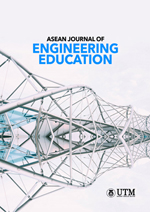Impact of Multi-Disciplinary International Engineering Service Learning in Instilling Global Engineer Attributes among Undergraduates
DOI:
https://doi.org/10.11113/ajee2019.3n1.30Keywords:
Engineering Service Learning, Multi-disciplinary team, Multi-Cultural team, Global Engineer Attributes, Reflective PracticeAbstract
International Engineering Service Learning engages multi-disciplinary and cross-cultural engineering
students in experiential learning through structured community service. Through participation in this effective pedagogy approach, students is expected to gain first-hand knowledge of engineering practice, global competency, actively contribute to the community through the service they performed and develop a personal appreciation for civic responsibility.In addition, what makes service learning an activity worthy of engineering course is its reflective nature. Reflective writing is one of important component in determining value of learning experience and it gives an impact on the students.This paper aimed to investigate the impact of multidisciplinary and cross-cultural engineering service learning among undergraduates through qualitative analysis done on their reflection journals. The findings indicated that this 9-day intensive program, utilizing the concept of multi-disciplinary and multi-cultural team for engineering service learning project, can be implemented to instill global engineer attributes among students.


















